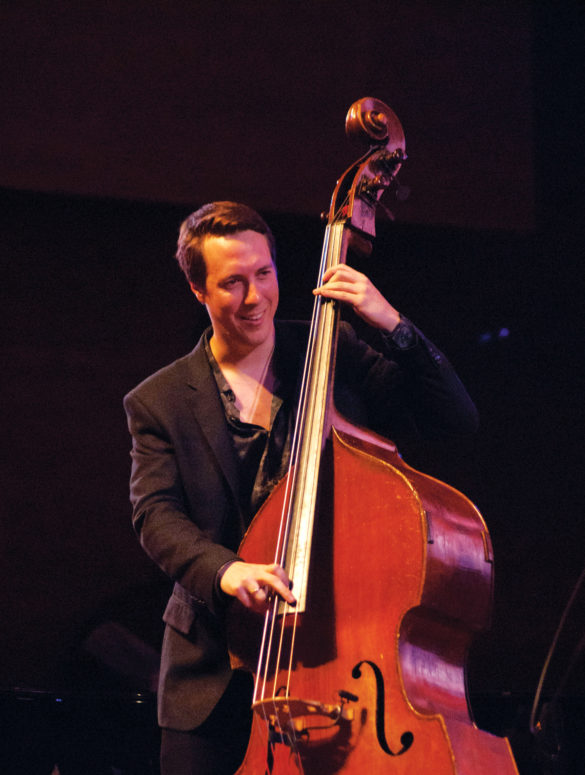By Mari Taketa
The world for Shawn Conley ’01 opened up the summer before high school, in Texas. His bass teacher, George Wellington Sr. of Punahou’s Music School, had persuaded his parents to send him to the biennial convention of the International Society of Bassists, and entered him in the 14-and-under competition. So there he was, a gangly teenager who fit bass practice between school, surfing and basketball, practicing feverishly for once. “I remember walking in and hearing the kids before me playing and thinking there’s something wrong,” Conley says. “That’s a different instrument. It doesn’t sound like mine. Mine must be broken.”
He didn’t do well. But the disappointment and confusion, though crushing, were fleeting. Conley was surrounded by the greatest bass players in the world, and their music filled the air. On closing night, he listened as Syrian virtuoso François Rabbath and Hal Robertson of the Philadelphia Orchestra played classical bass in part one of the finale concert; jazz legends Ray Brown, John Clayton and Christian McBride took the stage in part two. If Conley had arrived as a novice who saw bass as little more than a hobby, he was now riveted. He knew what he wanted to do for the rest of his life.
Back home, his mother, Nancy, would recall her son practicing at all hours. He talked about music, read about music, listened to classical, jazz and blues. In high school, Conley was invited to join the Honolulu Symphony. He played gigs in a pickup jazz band with adults more than 10 years his senior.
After graduating, he made it to the semifinals of the prestigious Thelonious Monk International Jazz Competition. He returned to the International Society of Bassists as a performer; later, he won its jazz competition. He played on movie soundtracks and performed with Sting, Peter Gabriel and Grammy-winning classical pianist Emanuel Ax. Invited to join cellist Yo-Yo Ma’s Silk Road Ensemble, he shared that group’s 2017 Grammy for Best World Music Album for “Sing Me Home.” “I was so lucky to have a teacher like George Wellington and parents who pushed me to go to that convention,” Conley says. “They totally supported me and helped me go for it.”

Luck wasn’t the only factor, of course. It delivered him to the moment that ignited his passion; from there it was his fascination with the big, rumbly-sounding bass, a drive that led him to the world’s best teachers and a complete openness to experimentation and even failure that delivered Conley to where he is now – a nationally sought-after master of the largest, most low-pitched string instrument being played today.
At 6 feet, a double bass is 2 feet longer than a cello. In classical music, it’s played with a bow and by plucking the strings; in jazz, blues and folk music the strings are plucked, sometimes with both hands at the same time. At first, well-meaning musicians, confounded by Conley’s pursuit of all genres, told him to focus and choose. That’s how most of the music world works: People become solo artists, or orchestra players, or jazz musicians.
But the world of the bass is a little different. As he studied with Paul Ellison at Rice University and Rabbath, the Syrian virtuoso he’d encountered as a teenager, in France, Conley realized he needed solid foundations in both classical and contemporary to explore the paths he wanted his music to take. “Luckily all of my teachers were savvy enough to be like, ‘No, it’s cool, do everything,’” he says. “‘If something doesn’t work out, it won’t work out and that’s fine. Don’t X something out because somebody said you shouldn’t do it.’”
So he did everything, seemingly everywhere. Based in Brooklyn, Conley was flying around performing, composing and arranging, teaching workshops, recording soundtracks for “True Grit” and “Moonrise Kingdom,” collaborating with opera singers, jazz vocalists and folk musicians. The Silk Road Ensemble, part of Yo-Yo Ma’s genre- and border-defying music, took him around the country on tour. He joined the band of French jazz singer Cyrille Aimée, and the touring intensified, through Europe and the United States.
All that changed with fatherhood. His son, Osian (pronounced ocean), was born into a dual musical household. Conley’s wife, Megan, is principal harpist with the Houston Symphony, and the family splits its time between Brooklyn and Texas. Now Conley is forced to choose, not between genres but between being on the road and being home with the nearly 2-year-old Osian. That’s narrowed his focus. Now, he mostly does composing and arranging, plays with the Brooklyn-based classical chamber orchestra, The Knights, and tours with Silk Road. There’s a sense of a new kind of centeredness, of a balance between the headiness of making music with world-renowned artists and coming home to be silly with Osian and cook for him and put him to bed. “It is definitely a huge difference getting off the plane in China and getting off the plane in Brooklyn and going to the park and being like, ‘Alright, let’s throw the ball,’” Conley says. “It’s a total dream job, all the groups I get to play with. I meet my heroes who become my friends, and then I meet new heroes. I wasn’t expecting to be doing what I’m doing. It’s kind of amazing.”
More Alumni Profiles – Spring 2019
Sarah Hicks ’89
Jon Magnussen ’86
Sarah Tochiki ’03
Music coverage – Spring 2019
A Celebration of Music
President’s Desk: A Legacy of Music
Timeline of music at Punahou
Featured musicians – Punahou Bulletin cover
Punahou Sessions

